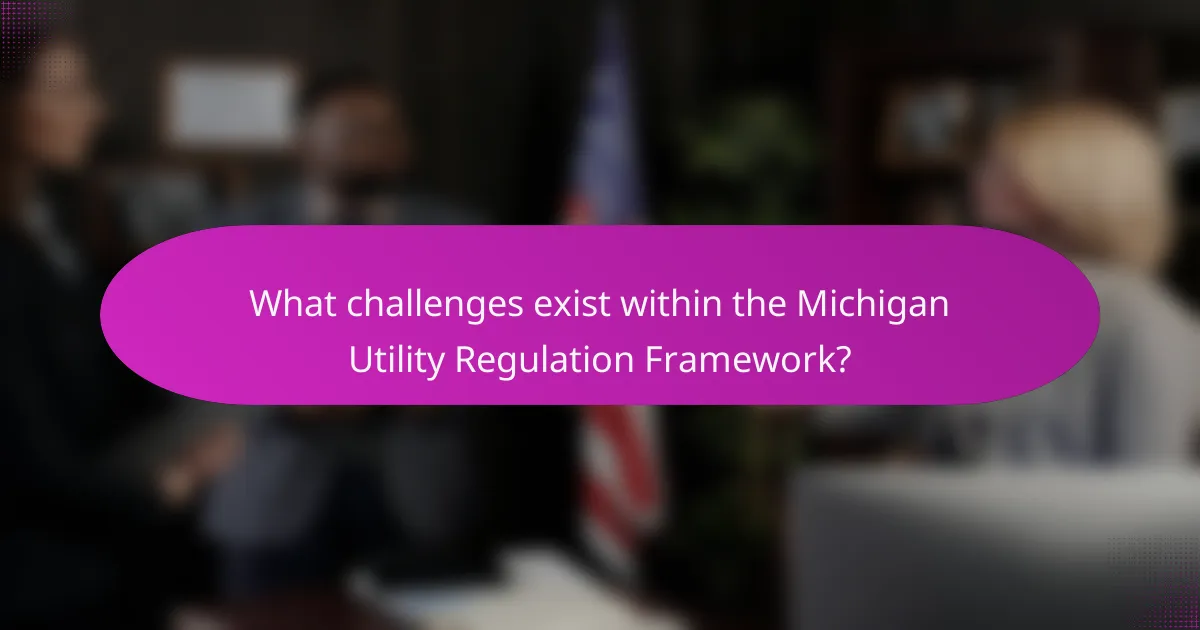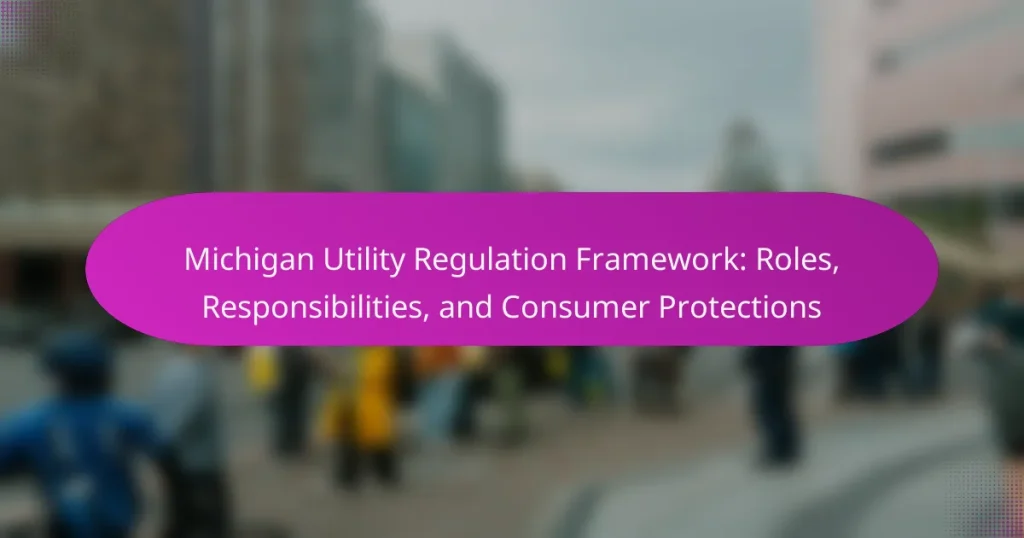
What is the Michigan Utility Regulation Framework?
The Michigan Utility Regulation Framework is a system governing the regulation of public utilities in Michigan. It establishes the legal and operational guidelines for utility companies. This framework is primarily overseen by the Michigan Public Service Commission (MPSC). The MPSC ensures fair rates and reliable service for consumers. The framework includes provisions for rate-setting, service quality, and consumer protections. It also addresses the roles and responsibilities of utility providers. The framework aims to balance the interests of utilities and consumers. It is essential for maintaining a stable energy market in Michigan.
How does the Michigan Utility Regulation Framework function?
The Michigan Utility Regulation Framework functions by overseeing the state’s utility services, ensuring they operate fairly and efficiently. The Michigan Public Service Commission (MPSC) regulates electric, gas, and water utilities. It establishes rates, reviews service quality, and enforces consumer protection laws. The MPSC also conducts public hearings to gather input from stakeholders. This framework aims to balance the needs of consumers and utility companies. The state law mandates that utilities provide reliable services at reasonable rates. Additionally, the MPSC can implement energy efficiency programs to promote sustainable practices.
What are the key components of the Michigan Utility Regulation Framework?
The key components of the Michigan Utility Regulation Framework include the Michigan Public Service Commission (MPSC), which oversees utility rates and services. The framework establishes regulatory authority to ensure fair pricing and reliable service. It mandates utilities to provide adequate service and maintain infrastructure. Consumer protection measures are integrated to safeguard customer rights. The framework also includes requirements for utility transparency and accountability. Additionally, it encompasses energy efficiency programs aimed at reducing consumption. Lastly, the framework promotes renewable energy initiatives to support sustainability goals.
How do these components interact within the framework?
The components within the Michigan Utility Regulation Framework interact through a structured system of roles and responsibilities. Regulatory bodies, such as the Michigan Public Service Commission, oversee utility operations. Utilities must comply with regulations to ensure consumer protection and service reliability. Consumers have the right to voice concerns and seek redress through established channels. Each component informs and influences the others, creating a dynamic regulatory environment. For instance, consumer feedback can lead to regulatory changes, impacting utility practices. This interaction ensures accountability and promotes fair practices in utility services.
What roles do different entities play in the Michigan Utility Regulation Framework?
The Michigan Utility Regulation Framework involves several key entities, each with distinct roles. The Michigan Public Service Commission (MPSC) regulates utility rates and services. Utilities, such as electricity and gas providers, deliver services to consumers. Consumer advocacy groups represent the interests of residents in regulatory matters. The legislature enacts laws that shape utility regulations. Local governments may influence utility operations through zoning and infrastructure decisions. Each entity collaborates to ensure fair pricing and reliable service for consumers. This framework aims to balance the needs of utilities and the public effectively.
What is the role of the Michigan Public Service Commission?
The Michigan Public Service Commission (MPSC) regulates public utilities in Michigan. Its role includes overseeing electric, gas, telecommunications, and water services. The MPSC ensures fair rates for consumers and promotes safe and reliable utility services. It also implements energy policies and encourages energy efficiency programs. Additionally, the commission resolves disputes between utilities and consumers. Established in 1939, the MPSC operates under the authority of the Michigan Public Service Commission Act. It plays a critical role in balancing the interests of consumers and utility providers.
How do utility companies contribute to the framework?
Utility companies play a crucial role in the Michigan Utility Regulation Framework. They provide essential services such as electricity, gas, and water to consumers. Their operations are governed by regulations that ensure reliability and safety of these services. Utility companies must comply with state laws and regulations set by the Michigan Public Service Commission (MPSC). This compliance includes maintaining infrastructure and meeting service quality standards. Additionally, utility companies are required to engage in transparent communication with consumers about rates and service changes. They also contribute to energy efficiency programs aimed at reducing consumption and promoting sustainability. These efforts support the overall framework by ensuring that consumers have access to safe and reliable utility services.
What responsibilities do consumers have within this framework?
Consumers have several responsibilities within the Michigan Utility Regulation Framework. They must pay their utility bills on time to avoid service interruptions. Consumers should also report any service issues or outages promptly to their utility provider. It is essential for consumers to understand their rights and obligations under the framework. They should participate in public hearings or comment periods regarding utility rate changes. Consumers are encouraged to keep informed about energy efficiency programs and available assistance. Additionally, they must provide accurate information to utility companies when requested. Engaging in energy conservation practices is also a key responsibility. These actions help ensure a fair and efficient utility system for all users.
What consumer protections are established under the Michigan Utility Regulation Framework?
The Michigan Utility Regulation Framework establishes several consumer protections for utility customers. These protections include the right to safe and reliable utility services. Customers are also entitled to clear and accurate billing practices. The framework mandates that utilities must provide advance notice of rate changes. It requires utilities to have a formal complaint process for customers. Additionally, there are provisions for payment plans for customers facing financial hardship. The Michigan Public Service Commission oversees these regulations to ensure compliance. These measures are designed to protect consumers from unfair practices and ensure access to essential services.
How does the framework ensure fair pricing for consumers?
The Michigan Utility Regulation Framework ensures fair pricing for consumers through regulatory oversight and established rate-setting processes. Regulatory bodies evaluate utility pricing structures to prevent unjust rates. They require utilities to justify proposed rate increases based on operational costs and service quality. Public hearings allow consumer input, ensuring transparency in pricing decisions. Additionally, the framework mandates regular audits of utility financials to verify compliance with pricing regulations. These measures collectively protect consumers from excessive charges while promoting equitable access to utility services.
What measures are in place to handle consumer complaints?
Consumer complaints in Michigan are handled through a structured process involving the Michigan Public Service Commission (MPSC). The MPSC allows consumers to file complaints regarding utility services. This can be done via phone, online, or through written correspondence. Once a complaint is received, it is reviewed and investigated by MPSC staff. The staff may facilitate communication between the consumer and the utility company. If necessary, the MPSC can hold formal hearings to resolve disputes. Additionally, utilities are required to have their own complaint resolution procedures in place. These measures ensure that consumer issues are addressed effectively and transparently.

How does the Michigan Utility Regulation Framework impact consumers?
The Michigan Utility Regulation Framework impacts consumers by establishing guidelines for utility rates and services. This framework ensures that utility companies operate fairly and transparently. It also mandates that services provided meet specific reliability and safety standards. Consumers benefit from protections against unjustified rate increases. Additionally, the framework allows for consumer input in regulatory processes. It supports programs aimed at energy efficiency and affordability. The Michigan Public Service Commission oversees these regulations, ensuring compliance and addressing consumer complaints. Overall, this framework promotes equitable access to utility services for all consumers in Michigan.
What are the benefits of the Michigan Utility Regulation Framework for consumers?
The Michigan Utility Regulation Framework provides several benefits for consumers. It ensures fair pricing for utility services. This framework promotes transparency in utility rates and practices. Consumers gain access to reliable energy and water services. It also establishes consumer protection measures against unfair practices. Additionally, the framework encourages utility investments in infrastructure. These investments lead to improved service reliability. The Michigan Public Service Commission oversees these regulations to maintain accountability. This oversight helps protect consumer interests and fosters trust in utility providers.
How does the framework promote transparency in utility operations?
The framework promotes transparency in utility operations by establishing clear reporting requirements. Utilities must disclose financial data, operational metrics, and service quality indicators. This information is made accessible to the public and regulators. Regular audits and assessments are mandated to ensure compliance. Stakeholder engagement processes are also outlined, allowing consumer input in decision-making. Additionally, the framework mandates public hearings on rate changes, enhancing accountability. This structured approach ensures that utility operations are subject to scrutiny. As a result, consumers can make informed choices regarding their utility services.
What protections are offered against service disconnections?
Utilities in Michigan provide various protections against service disconnections. These protections include a moratorium on disconnections during extreme weather conditions. Additionally, customers may receive a notice prior to disconnection, allowing them to address any outstanding bills. The state also mandates that utilities offer payment plans to assist customers in managing their debts. Furthermore, low-income households may qualify for assistance programs to prevent disconnections. These measures are designed to ensure that essential services remain accessible, particularly for vulnerable populations.
How can consumers navigate the Michigan Utility Regulation Framework effectively?
Consumers can navigate the Michigan Utility Regulation Framework effectively by understanding their rights and available resources. They should familiarize themselves with the Michigan Public Service Commission (MPSC) guidelines. The MPSC provides information on utility rates, services, and consumer protections. Consumers can access resources through the MPSC website or contact the MPSC for assistance. They should also keep records of their utility bills and communications. Understanding the complaint process is crucial for addressing issues. Engaging in public hearings can influence regulatory decisions. Utilizing local advocacy groups can provide additional support and information. These steps empower consumers to make informed decisions regarding their utility services.
What resources are available for consumers to understand their rights?
Consumers can access various resources to understand their rights in Michigan’s utility regulation framework. The Michigan Public Service Commission (MPSC) provides comprehensive information on consumer rights and protections. Their website includes guides, FAQs, and contact information for assistance. Additionally, local consumer advocacy organizations offer workshops and materials that explain utility rights. Legal aid services also assist consumers in understanding their rights and navigating disputes. These resources collectively empower consumers to make informed decisions regarding their utility services.
How can consumers file complaints or seek assistance?
Consumers can file complaints or seek assistance by contacting the Michigan Public Service Commission (MPSC). They can reach the MPSC through its website or by phone. The MPSC provides an online complaint form for consumers to submit their issues. This form allows consumers to detail their concerns regarding utility services. Additionally, consumers can call the MPSC’s customer service line for immediate assistance. The MPSC is mandated to address consumer complaints under the Michigan Utility Regulation Framework. This ensures that consumer rights are protected and issues are resolved effectively.

What challenges exist within the Michigan Utility Regulation Framework?
The Michigan Utility Regulation Framework faces several challenges. One major challenge is the complexity of regulatory processes. This complexity can lead to delays in decision-making. Another challenge is the balancing of consumer protection with utility profitability. Utilities often seek to maximize profits, which may conflict with consumer interests. Additionally, there is a lack of transparency in rate-setting processes. Consumers may not fully understand how rates are determined. The regulatory framework also struggles with outdated infrastructure. Aging infrastructure can hinder service reliability and increase maintenance costs. Furthermore, there is limited public participation in regulatory proceedings. This limits consumer input on critical issues affecting utilities. These challenges collectively impact the effectiveness of utility regulation in Michigan.
What are common issues faced by consumers in this framework?
Consumers in the Michigan Utility Regulation Framework commonly face issues such as high utility rates. Many consumers report difficulty in understanding their bills. Billing errors can also lead to disputes between consumers and utility companies. Delays in service restoration after outages are frequently cited frustrations. Additionally, consumers often experience challenges in accessing energy assistance programs. The complexity of regulations can create confusion regarding consumer rights. Limited availability of renewable energy options is another concern for consumers. These issues highlight the need for improved transparency and consumer education within the framework.
How do regulatory changes affect consumer protections?
Regulatory changes can significantly impact consumer protections by altering the rules governing utility services. These changes may enhance or diminish the protections afforded to consumers. For instance, stricter regulations can lead to improved transparency in billing practices. They may also enforce stricter penalties for service disruptions. Conversely, deregulation can reduce oversight, potentially leading to higher rates and less reliable service. Historical data shows that states with robust regulatory frameworks often report higher consumer satisfaction. In Michigan, recent regulatory shifts have aimed to balance utility company interests with consumer rights.
What are the implications of utility rate increases for consumers?
Utility rate increases lead to higher monthly expenses for consumers. This can strain household budgets, especially for low-income families. Increased rates may also prompt consumers to reduce energy usage to save costs. As a result, this can lead to decreased comfort levels in homes. Utility rate hikes can also affect consumer behavior, encouraging the adoption of energy-efficient appliances. In Michigan, the Michigan Public Service Commission regulates these rates to ensure fairness. Historical data shows that utility rate increases have occurred periodically, impacting consumer spending patterns. For example, a 2021 report indicated a 3% increase in electricity rates, affecting thousands of households.
What are best practices for consumers engaging with the Michigan Utility Regulation Framework?
Consumers should familiarize themselves with the Michigan Utility Regulation Framework to effectively engage with it. Understanding the roles of the Michigan Public Service Commission (MPSC) is crucial. Consumers can attend public hearings to voice their concerns and opinions. They should also review utility rate cases and proposed changes. Submitting comments during public comment periods can influence decisions. Staying informed about energy efficiency programs can lead to cost savings. Utilizing resources like the MPSC website provides valuable information. Lastly, consumers should know their rights regarding service disconnections and billing disputes. Engaging proactively ensures better consumer protection and advocacy.
How can consumers advocate for better utility services?
Consumers can advocate for better utility services by actively participating in public hearings. These hearings allow consumers to voice concerns directly to utility regulators. Engaging with local government representatives is also effective. Consumers can express their needs and expectations regarding utility services. Joining consumer advocacy groups amplifies their voice. These groups often have resources and expertise to influence policy changes. Submitting formal complaints to regulatory agencies is another avenue. This process can highlight specific issues and prompt investigations. Utilizing social media platforms raises awareness and mobilizes community support. Increased public pressure can lead to improved services.
What steps should consumers take to stay informed about regulatory changes?
Consumers should subscribe to updates from regulatory agencies. This includes the Michigan Public Service Commission (MPSC) and other relevant bodies. Monitoring their websites for press releases and announcements is essential. Attending public meetings can provide direct insights into upcoming changes. Following industry news through reliable media sources keeps consumers informed. Joining consumer advocacy groups can also help in understanding regulatory shifts. Utilizing social media channels of these organizations can provide real-time updates. Engaging with community forums allows sharing of information and experiences regarding regulatory changes.
The Michigan Utility Regulation Framework is a comprehensive system that governs the regulation of public utilities in Michigan, primarily overseen by the Michigan Public Service Commission (MPSC). This framework establishes guidelines for utility rates, service quality, and consumer protections, aiming to balance the interests of utilities and consumers while ensuring reliable service. Key components include the roles of various entities, consumer responsibilities, and mechanisms for addressing complaints, alongside provisions for transparency and accountability. The framework also addresses challenges such as high utility rates and the need for improved consumer education, ultimately impacting the quality and affordability of utility services for residents in Michigan.


